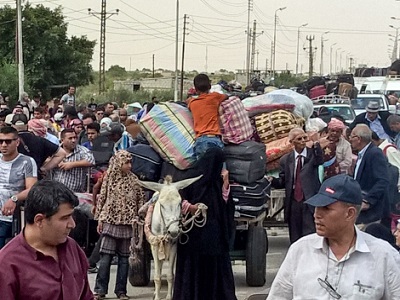
By Matthew Ayton
The people of the economically immiserated Gaza Strip have been given a semblance of relief as Egyptian President Abdel Fattah el-Sisi has announced that the Rafah crossing – Gaza’s lifeline with the outside world – will open more frequently.
Sisi has observed Israel’s blockade on Gaza since his coming to power, and the Rafah border crossing has remained hermetically sealed since October 2014.
Relations between Sisi and Hamas, which rules the Gaza strip, have been tenuous at best, as Hamas are an offshoot of the Egyptian Muslim Brotherhood, the organization that Sisi has dedicated most of his presidency to purging from Egypt.
The Rafah crossing remained open for a week during the beginning of Ramadan to, according to the Major General of Egypt’s borders, “ease the humanitarian situation of the Palestinian people in Gaza.”
Sisi allegedly said that the crossing will be opened more regularly, making particular reference to “public occasions.”
However, while this change in policy direction might be attributed to a magnanimous Ramadan spirit, there are other factors at play which might help to explain it.
Placating International Criticism for Human Rights Abuses
There has been a torrent of international criticism in the wake of the Egyptian court’s decision to sentence ex-president Morsi to death. The US, a major patron and military ally to Egypt, called the decision “deeply troubling” and noted it as “politically motivated.” Turkish President Recep Tayyip Erdogan excoriated the verdict as “as massacre of law and basic rights.”
UN chief Ban Ki-moon also gave his comments by questioning the legitimacy of what he called Egypt’s “mass trials,” and expressed concern over the impacts these could have on the “long-term stability in Egypt.”
Criticism has been leveled by human rights organizations: “ President Sisi of Egypt has presided over the flagrant abuse of human rights since taking office,” said one Human Rights Watch report in May 2015.
Joe Stork, the deputy Middle East and North Africa director for the group called on Western governments to avoid “subordinating human rights in their relations with Egypt.”
Earlier this month, a joint letter was sent by a coalition of human rights organizations – including Amnesty International – calling on German Chancellor Angela Markel to “speak out against Egyptian government policies like mass arrests” before Merkel was due to host Sisi in Berlin on June 3.
It is possible that Sisi is trying to offset some of this condemnation through showing compassion for the plight of Palestinians in Gaza by lifting the Rafah border restrictions, facilitating travel to the 15,000 registered Palestinians who were waiting to travel before Ramadan.
Keeping Hamas in the Sunni camp, or at least away from the Shia
It is likely that Sisi wishes to loosen the chokehold around the neck of Hamas given the changing geopolitics of the region, especially those to do with Iran.
Hamas is primarily a Sunni movement, and although it is in the interests of Sisi, like Israel, to keep Hamas isolated and unable to access the materials necessary for increasing its military strength, pushing Hamas further toward the Iran-led Shia camp for support could be disastrous and give Iran a foothold in both Egypt and Israel’s backyard.
At the moment, Iran is engaged in its own diplomatic tussle with the final-stage nuclear talks in Vienna. However, if the deal were to be a success, this would see economically debilitating sanctions lifted from Iran, and a newly emboldened Shia theocracy. Sisi’s Egypt falls staunchly in the Sunni camp with Saudi Arabia, and both countries are currently making a cohesive and concerted military effort to oust Iranian-backed Houthi rebels from Yemen. This, combined with Iran’s influence in Syria and Lebanon, means that it is in the interests of Sisi to act before Iranian influence reaches Egypt’s borders with Gaza.
Therefore it may be, that in Sisi’s strategic calculus, temporary appeasement of Hamas is better than keeping the blockade on Rafah, which may push Hamas closer into the arms of Iran.
Israel and Hamas Talks
There are signs that the mood music between Hamas and Israel may be gradually changing. And as a result, so too, may Egypt’s.
There are wide reports this month of Hamas and Israel involved in “indirect” talks over an easing of the blockade and entry of materials into Gaza in “exchange for quiet.” This has also come on the heels of the former head of Israel’s Mossad intelligence service calling for “direct dialogue” between Hamas and Israel.
Around the same time, as reported by Israeli news source Haaretz, many Egyptian officials have been speaking of a “need to talk to Hamas,” making specific reference to the Gaza-based Islamist party and not other Palestinian factions.
Such comments culminated in Egypt’s opening of Rafah over the last week, and 188 truckloads of construction material, including thousands of tons of cement, were allowed to pass without security inspection into Gaza.
As a result of Israel’s ostensible talks with Hamas, Sisi likely feels less compelled to enforce the iron curtain at Rafah. He may also be attempting to send a political message to Israel: that if you engage in talks with our enemies (the Muslim brotherhood), then we can’t continue to ensure your security.
Regional politics aside, one thing is definitely certain: that the opening of Rafah provided Gaza’s Palestinians with a temporary respite from total entrapment, and a glimmer of hope for the future.
– Matthew Ayton is a freelance writer and researcher of Middle East affairs, previously based across the Middle East. (This article was published in Ma’an, and is republished with permission from the author)




